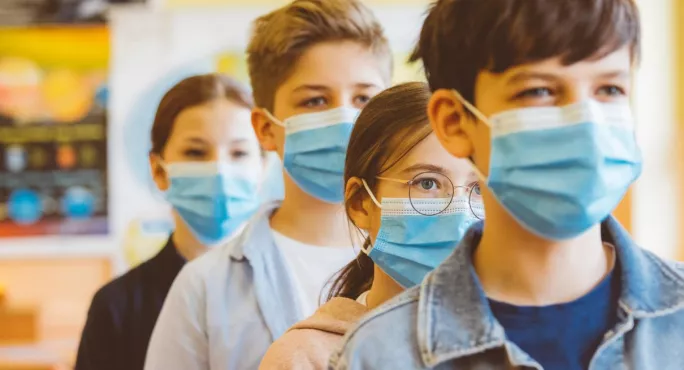‘Very worrying’ school masks plan ‘contradicts science’

Headteachers have said it is “very worrying” that Boris Johnson’s decision to relax the requirement for face masks in secondary schools appears to contradict scientific evidence.
The prime minister said today that masks would no longer be required in classrooms and students will not need to wear them in the corridors of secondary schools or colleges from 17 May, as he announced a wave of relaxations to Covid restrictions.
The Association of School and College Leaders (ASCL) has questioned why the government is making this move when evidence published by the government’s Scientific Advisory Group for Emergencies (SAGE) said that it was important to maintain the current Covid mitigation measures in schools, including wearing masks.
Boris Johnson: Masks out of classrooms from 17 May
Restrictions: Overnight school trips possible soon, says PM
Exclusive: England set to U-turn on masks in schools
And as the prime minister was speaking at tonight’s press conference, new SAGE minutes were published, which said that masks and mass testing were thought to have reduced Covid-19 transmissions in school by 30 per cent.
ASCL general secretary Geoff Barton said: “We recognise that there are arguments both for and against pupils wearing face masks in classrooms. It is therefore doubly important that any decision over their continued use should be based firmly upon scientific advice.
Covid: ‘Why the rush to remove face masks in schools policy?’
“However, the government’s decision to relax the rules around face masks in secondary schools and colleges is hard to reconcile with evidence published by the Scientific Advisory Group for Emergencies on Friday. This evidence quite clearly said that it was important to maintain the current mitigation measures in schools, including mask wearing, in the coming months.
“It is obviously better for communication and learning if masks aren’t required in classrooms, but any decision to this effect must follow the scientific advice, and it is very worrying that the government’s decision appears to contradict the published evidence. This is particularly troublesome in light of the fact that a Covid strain first detected in India has recently been declared a ‘variant of concern’ by Public Health England, as this would suggest the need for greater caution.
“It seems to us that school and college leaders are once again being placed in a very difficult position because many parents and staff will obviously feel that pupils should continue to wear masks, regardless of what the government thinks. For the sake of a few more weeks, all this unnecessary anxiety could have been avoided and we don’t understand why the government is in such a rush over this issue.”
The latest SAGE report published today says: “We assume that the introduction of mass testing and mask wearing in schools from March 2021 results in an additional 30 per cent reduction in transmission resulting from school-related contacts.”
This finding was from an assessment report from the London School of Hygiene and Tropical Medicine.
Paul Whiteman, general secretary of the school leaders’ union the NAHT, said: “Creating the confidence that this next step is the right thing to do is essential to avoid an unnecessary shock to a system in recovery.
“Parents, pupils and staff will want to understand why removing the requirement for face coverings in classrooms is considered appropriate when it is not for other enclosed spaces.”
Ian Noon, head of policy at the National Deaf Children’s Society, said: “Today’s announcement will mean thousands of deaf children and young people can breathe a huge sigh of relief.
“For more than a year, they’ve struggled against isolation, loneliness and inaccessible online lessons, only to be hit with a whole new set of challenges caused by face masks when they returned to school.
“Public health must always be the priority, but deaf young people have repeatedly told us that face masks left them seriously struggling to socialise, understand their teacher and maintain their mental health during what was an extremely challenging period of their lives.”
You need a Tes subscription to read this article
Subscribe now to read this article and get other subscriber-only content:
- Unlimited access to all Tes magazine content
- Exclusive subscriber-only stories
- Award-winning email newsletters
Already a subscriber? Log in
You need a subscription to read this article
Subscribe now to read this article and get other subscriber-only content, including:
- Unlimited access to all Tes magazine content
- Exclusive subscriber-only stories
- Award-winning email newsletters



